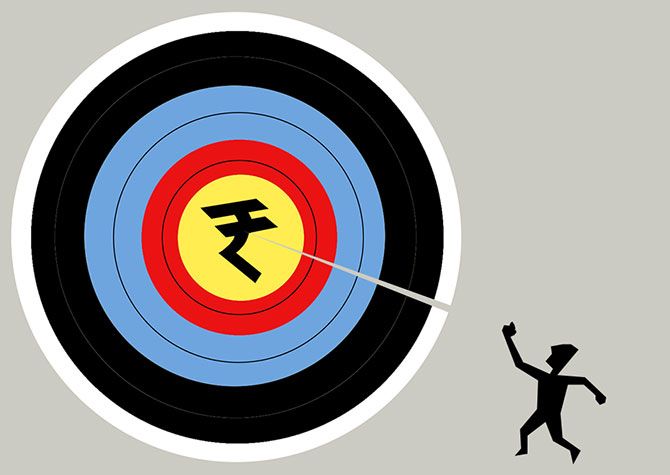The gains from investing in direct plans can be higher than the difference in expense ratios, says Sanjay Kumar Singh.
Illustration: Dominic Xavier/Rediff.com

Most investors believe tha the difference in performance between direct plans and regular plans of funds is equal to the difference in expense ratio. But this is not always the case.
The difference in returns can actually be higher than the difference in expense ratio. This has implications for long-term wealth building.
Investors should take this into account when deciding whether to invest in direct or regular funds.
This difference arises because of the way the net asset value (NAV) is calculated.
The NAV is the market value of the scheme's portfolio less any accrued liabilities (including expenses) incurred on a daily basis.
This number is divided by the total number of outstanding units to arrive at the NAV.
Let us explain this with a simplified example.
Suppose that you buy a fund for Rs 100 at the start of the year. It has two plans -- one regular and one direct.
Suppose that the regular plan has an expense ratio of two per cent and the direct plan has an expense ratio of one per cent.
Over a year, the portfolio gives a return of 20 per cent so that the Rs 100 grows to Rs 120. But what comes into the hands of the investor is net of fee.
The fee is calculated on the market value of the portfolio.
Suppose that the fee is deducted only on the last day of the year.
In case of the direct plan, one per cent of Rs 120 would be deducted (Rs 1.20). Hence the direct plan would have an NAV of Rs 118.80.
In case of a regular plan, two per cent of Rs 120 would be deducted, giving an NAV of Rs 117.60.
The difference in NAV between the two plans comes to Rs 1.20 (118.80 less 117.60).
This is higher than the difference in expense ratio (which was one percentage point or Rs 1 in absolute terms).
Says Nikhil Banerjee, co-founder, Mintwalk: "In the normal course, the difference in performance of a direct and regular fund is higher than the difference in expense ratios because the expense is deducted on market value (Rs 120 here) and not on the original investment (Rs 100 in this case)."
For the sake of simplicity, we assumed that the fee gets deducted at the end of the year.
"In reality, both the gains and the accrued expenses are factored in daily to declare the NAV. This creates a compounding impact," says Banerjee.
In some circumstances, say experts, the results may be different, that is, the magnitude of outperformance by direct funds over regular funds may not exceed the difference in their expense ratios, such as in the case of more volatile portfolios (though direct plans will always outperform).
Broadly, however, these numbers indicate that over the long term (say, 25 to 30 years) you stand to gain more by investing in direct plans.
"Do-it-yourself investors, who can manage their asset allocation and choose the right funds should definitely opt for direct plans," says Vishal Dhawan, chief financial planner, Plan Ahead Wealth Advisors.
Investors who lack knowledge should pay a fee to an advisor to get their portfolio planned and then buy direct plans.
Investors who are uncomfortable writing a separate cheque for an advisor may opt for the regular plans.
But they run the risk of suffering due to the conflict of interest that arises in an embedded-fee model: The seller may sell you funds where s/he earns a higher commission rather than what is best for you.












 © 2025
© 2025